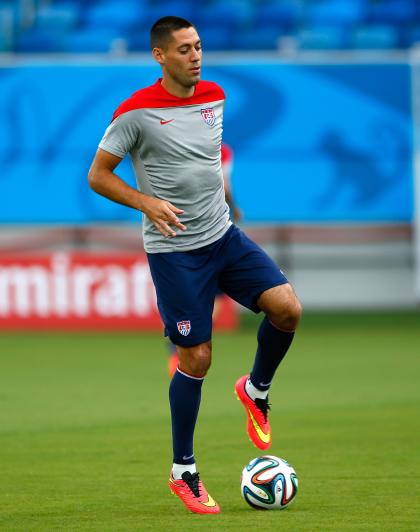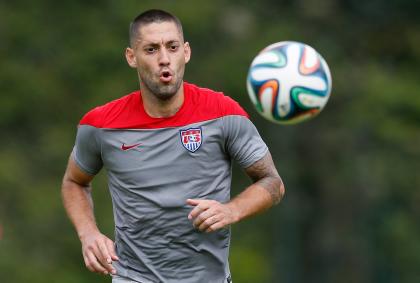Clint Dempsey must get U.S. on good side of World Cup referees

For complete World Cup 2014 coverage, visit Yahoo Sports and follow @YahooSoccer.
NATAL, Brazil – Believe it or not, despite the furor over disputed decisions during the first few days of the World Cup, referees actually get some calls correct. For a player, they are the ones you can't argue with.
Then there are the calls where the ref is blatantly wrong, but he is so convinced by what he thinks he saw that hell freezing over wouldn't change his mind. Those are the ones that you can't do anything about.
Then comes soccer's game within a game: The 50-50 calls that so often make all the difference between triumph and disaster and can be decided by tiny fractions of an inch or the interpretation of a single individual.
[Photos: Everything you need to know about Clint Dempsey]
It is there where, sadly, persuasion comes into the equation, and it is a game that United States captain Clint Dempsey will have to play, and play well, for the Americans to be successful in this tournament.
Referees, despite popular myth, are indeed human and most of them even have regular human emotions. The rapport that a team captain strikes up with an official can and certainly does influence the outcome of games.

It is not right. It wouldn't fly in the NFL, where booth reviews serve as the ultimate doubt eraser. But it's soccer and that's just how it is. Fortunately for the Americans, according to Dempsey's Seattle Sounders teammate Brad Evans, they have a master persuader at their disposal.
"Clint knows how to talk strongly without overstepping, and that is a great quality to have, especially when he is on your team," Evans told Yahoo Sports at USA's pre-World Cup training camp, just days before he was among the team's last seven cuts.
"It is about getting your point across and getting it across where it's not demeaning at any point, so it's good. Guys are going to lean on him during the World Cup. He is old enough and mature enough and experienced enough to have that confidence in that situation, and I know that he will.
"It is a huge factor to this team."
"We had a meeting [with the referees] two days ago to where we heard what things they are looking for and what they are going to be reffing in terms of yellow cards, red cards, stuff like that," Dempsey said Sunday, the day before the U.S. plays Ghana in the teams' tournament opener.
"We will work hard to see what we will have to do. And we will be prepared and ready to go."
[Video: Yahoo experts dish on keys to U.S. vs. Ghana]
While offside calls are the duty of the assistant referees on the sidelines, the man in the middle will generally make the decision on fouls, which often involve a split-second judgment and entirely revolve around perceived grades of contact in the referee's mind.
How much contact is too much? Who initiated the contact? Was it severe enough for a foul to be called? Were both players fouling each other? If so, which one was worse?

A 50-50 decision is guaranteed by its very nature to annoy someone. Players screaming and complaining to referees about every call that goes against them is a common sight but is far from being the best approach. The smart way is not haranguing the official. He is not going to change his mind.
Though their frustration was understandable, the way Croatia's players got right in the face of Japanese referee Yuichi Nishimura following his controversial penalty award to Brazil in Thursday's opening game is a blueprint of what not to do.
The key is subtlety, which is precisely what Evans was talking about. Smart players will use reasoned argument to cast some doubt into the referee's mind over whether he just made the correct call. He is not going to reverse it, but the hope is that he will give you the benefit of the doubt to even things up next time.
[Photos: U.S. Men's National Team: A social (media) journey]
These conversations don't generally take place face to face during a break in play, but they do while the game is going on in small snippets of assertive but respectful comments.
And it does work. Even Vedran Corluka of Croatia, after lambasting Nishimura and criticizing FIFA for appointing an official who doesn't speak English, admitted the Japanese referee had tried to even things up late in the Brazil game by giving some questionable calls to Croatia.
At the global level, soccer is a game of margins and perspective, especially when teams from different continents square off against each other. For example, the nature of the game in South America is far different than in Europe, where a higher level of physicality is tolerated as part of the sport. A defender's shoulder nudge that would be whistled for a foul in London or Munich would probably have a blind eye turned to it in Buenos Aires.
Dempsey knows all of this. He is the United States' best and most important player. But in this World Cup, with the officials undoubtedly nervous following the early criticism, he has another vital role to play.

